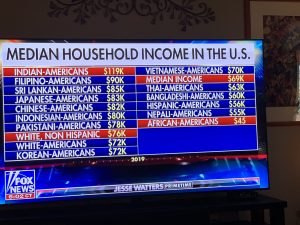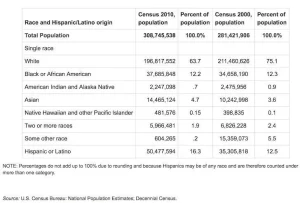We hear a lot about how “white privilege” is a dominant issue in America today—that, and the racism such alleged privilege portends.
According to the white privilege zealots, whites are prosperous and reside at the top of the economic heap, while minorities in America are struggling and barely surviving at the bottom of the pile.
The essence of white privilege is that American society advantages whites and disadvantages blacks.
I have often wondered just how valid that hackneyed catchphrase is and after much thought and research I have decided it has no validity—other than its use as a lame justification for those who won’t expend the energy needed to work and achieve some manner of success.
Even though America has always been a land of opportunity, we hear repeatedly that the American Dream is only achievable for whites.
Let’s take a look at the facts.
As someone once said: “From principles is derived probability, but truth or certainty is obtained only from facts.”
Take a look at the following graphic which is compiled from the 2019 Census Bureau report on income and poverty—the most recent figures available.
After examining it, please explain to me why white Americans are stuck in the middle of the pack when it comes to median income, while those at the top are Indian-Americans, Filipino-Americans, Sri-Lankan-Americans, Japanese-Americans, Chinese-Americans, Indonesian-Americans, and Pakistani-Americans?

What that graphic tells me is that America is still a land of opportunity and the American dream lives on.
It also tells me that’s why hundreds of thousands of people on this planet continue to immigrate—both legally and illegally—to America. It certainly isn’t because they view America as a racist place rife with white privilege.
It’s a country that provides an unparalleled opportunity for those with ambition, talent, creativity, and a willingness to work hard.
The starkest fact in this chart is the location of African-Americans on the income ladder. The economic status of Black Americans remains far behind their white, Asian, and Hispanic counterparts in terms of income, net worth, home ownership, stock ownership, business entrepreneurship, and other metrics, according to a new report from research and consulting firm, McKinsey Global Institute.
That is borne out by the median $45,000 household income of black Americans—fully $74,000 lower than that of Indian-Americans.
Why is that? I am not a sociologist, but even a bit of cursory research tells me that the main reasons are (1) inadequate education; (2) absence of a strong family structure, i.e., no father in the home; (3) a dearth of admirable and accomplished examples for children to emulate; (4) living in high crime areas in cities; (5) an overabundance of children being reared by single mothers; and (6) the residual effects of a history of racial prejudice that has not been fully eradicated by affirmative action and other bootstrap programs.
The fact is, that racial groups differ in their cultural environment. According to the Center for Equal Opportunity, in 2019 40% of births in the United States were out of wedlock. The particular out-of-wedlock birth rates were 11.7% for Asians, 69% for blacks, 52% for Hispanics, 68% for Native Americans, and 28% for whites.
According to the Brooking Institution, children raised by single mothers are less likely to graduate, do worse in school, have more physical and psychological problems, are more likely to be involved in crime, and so on. The out-of-wedlock birth rates in the black community have been skyrocketing over the decades even as alleged racism has been plummeting. In addition, the general ordering of out-of-wedlock birth rates likely tracks the countries from which people came. Hence, it is unlikely that racism explains most, let alone all, of these differences.

I am sure there are more reasons that I have not touched on, but the fact remains, that those at the top of the median income pyramid have traditionally emphasized excellent education for their children and typically have strong families.
The McKinsey report said that some of the pay gaps could be alleviated by offering young blacks more paid apprenticeships and internships. As for young Blacks gravitating towards higher-paying careers in the near future, particularly in jobs related to science, technology, engineering, and mathematics (STEM), McKinsey noted only 6% of computer science and engineering students are Black. McKinsey suggests corporations could encourage more Black students to enter the STEM curriculum in schools through sponsorship programs.
I am not sure how this will ever be remedied when all I hear today from black race hustlers is that mathematics and science are symbols of white racism used to keep blacks “down.”
The economic plight of Blacks is reflected by other metrics: at the end of 2020, the homeownership rate for Blacks was at 44% (roughly the same as in 1970), versus 74% for whites. And while 18.6% of white households own stocks, only 6.7% of Black households do. Both these factors dampen the ability of Blacks to grow wealth.
The U.S. Census Bureau identified about 124,000 Black-owned businesses with more than one employee, meaning they account for only 2% of the nation’s total, well below the 13% Black proportion of the U.S. population. Black-owned businesses are especially lacking in such industries as information technology, mining, oil and gas; utilities; agriculture; and manufacturing.

Meanwhile, other minority populations in America have managed to move into these lucrative businesses and few of them grumble about the lack of opportunity because of white privilege.
Indeed, by looking at the chart above, you would think white Americans might kvetch and bellyache about Asian-American privilege given their higher median household income rank.
The fact is, “check your privilege” is a lazy phrase levied at white people who voice the wrong opinion or sometimes simply dare to speak at all.
White women who do this are called “Karens.” White men who do so are called racists and bigots. White privilege is nothing more than a way for some people to shout “shut up,” while prohibiting any retaliation.
White privilege is a curious amalgamation of self-loathing liberals and narrow-minded and bigoted anti-whites, for whom the notion of white privilege is a useful vehicle.
While liberals employ the term to score “woke” points, anti-whites use it artfully to repackage racism: “I hate you because you’re white; it’s your fault, and it’s your responsibility to assuage it.”
No thank you. I’m not buying it.


Well researched, logical and articulated thoughtful analysis…..and accurate!
Thank you, Joe. I don’t believe most Americans are aware of these facts.
I’m not buying it either. Good analysis, Ron. Unfortunately, facts don’t resonate with those who want to blame others for their own shortcomings.
Ain’t that the truth!
In 1965, prominent Democrat Daniel Patrick Moynihan warned his party of the need for national action to counter the “steady disintegration of the Negro family structure.” His language may be obsolete, but not his understanding of the problem. Even Barack Obama, while campaigning for the presidency in 2008, highlighted the need for Black fathers to take responsibility for their families, saying that Black men “have abandoned their responsibilities, acting like boys instead of men… And the foundations of our community are weaker because of it.” The problem is apparent, even to Democrats, but they continually fail to take redemptive action.
The census data actually show that the average per capita income for some black groups is higher than that of whites. Guess what groups those are? Black immigrants from Africa. Which tells me everything I need to know. It clear that elements of the black culture of America has held blacks back because blacks from other countries kick butt here in America.
Thanks for that update, Steve. I wasn’t aware of that. I just used the data that Fox provided on Jesse Watters’s show.